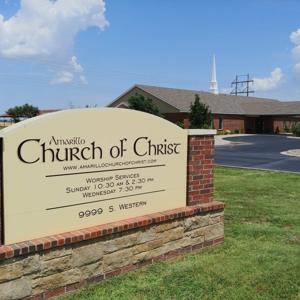New Testament Sermons / Speaker:Berry Kercheville
The Body Is For the Lord, and the Lord for the Body
Introduction: In David’s excellent sermon on Sodom we learned that one of the biggest threats we encounter in living for Christ is the culture in which we live. This is especially true in how culture affects Christians is in the realm of morality. Immorality, and especially sexual immorality doesn’t shock us any more. It is so common place that is nearly impossible to avoid. The fact that we deal with this in the public view is not new; surely Paul saw this constantly in Corinth. It was part of their religious culture in the city.
We tend to approach this subject simplistically. We say, “Don’t do that.” But as is typical in scripture, God rarely just gives us a “don’t.” It is important to God that he gives us reasons so we can understand how it damages us and is destructive to his purposes for us.
In the text before us, Paul does not go directly to the point and give us the “7th of the 10 commandments.” Instead, Paul reasons with the Corinthians so that they understand the damage they are doing by participating in sexual sins. Paul’s reasoning focuses on our bodies, and that will be the focus of our lesson.
Paul’s answer: But not all things are helpful/beneficial/builds up (a derivative of this word is used repeatedly by Paul for “building up the church”).
Second argument: “All things are lawful for me.” We do not know where this argument came from. Possibly a conclusion of “freedom in Christ” or a Corinthian’ doctrine derived from the Epicureans.
Paul’s answer: But I will not be dominated/enslaved by anything. Paul warns that even if you could argue this as a liberty, a Christian is not allowed to be enslaved by any human passion. This principle goes beyond sexual sins and includes all activities, even something that is not sinful of itself.
Third argument: “Food is meant for the stomach and the stomach for food.” This seems to be the argument for sexual immorality (similar in today’s culture). The stomach and food are made for each other. Therefore the sexual part of the body is made to be satisfied by sexual immorality.
And God will destroy both food and the stomach!Further, the body is not made for sexual immorality, but for the Lord, and the Lord is for the body. And God raised the Lord and will also raise us up by his power.Paul’s Explanation of God’s Purpose for the BodyNotice the emphasis on “body” throughout the text. The word is used 8x from verses 13-20, not counting the implication of body (vs. 14, “us”) and “members” in reference to the body (vs. 15), which then counts 12x.Further, though Paul speaks of the stomach and food that are temporary and will be destroyed, Paul does not say the body will be destroyed. In fact, just the opposite. Just as God raised up the Lord, so he will also raise us up. The message is that though there is a body now, there will also be a heavenly body to which the earthly body will be transformed. In other words, it is this body that will put on the imperishable and the immortal, and it is therefore important how we use our body. It is our body, and to violate it with sexual immorality has an eternal effect. Did you ever think of your body that way? Do we consider what we do with our bodies so that we present ourselves in purity for when the Lord takes our same body and transforms it? Paul then says something that would be truly shocking to most people in the world, and even at times to us. It is not just that the body is not destroyed and has a connection to our eternal bodies, it is also that “the body is for the Lord.”Paul reinforces this point in verses 19-20. Note carefully, “you are not your own, for you were bought with a price.” That is, your body is not your own. We do not get to do with our bodies whatever we want. What that makes us is stewards of our body, that is, God has given us this body and we are to be caretakers of it. This brings up an interesting parallel to Jesus. Hebrews 10:5, “Consequently, when Christ came into the world, he said, ‘Sacrifices and offerings you have not desired, but a body have you prepared for me.’” It is only in a body that Jesus is able to glorify God, which is exactly Paul’s point in 6:20, “So glorify God in your body.”Vs. 15-17 Paul’s next argument follows up on the concluding statement of verse 13: “The body…is for the Lord, and the Lord for the body.” “…your bodies are members of Christ.” Just as our own bodies have various “members” (arms, legs, eyes, etc.), so we each are a member of Christ’s body. This argument is different than chapter 12 where we see ourselves with gifts that are to be utilized together with gifts in the body. In this case, the emphasis is on our connection to Christ, our bodies connected to him and used by him to glorify God. Now notice the phrase, “shall I take the members of Christ and make them members of a prostitute?” The Greek for “take” is defined as “take away; to remove, destroy, kill.” CSB translates: “So should I take a part of Christ’s body and make it part of a prostitute? Absolutely not!” In other words, to misuse our bodies in sexually immoral ways means we must detach ourselves from the body of Christ and our usefulness to him, and then attach ourselves to an immoral woman and thus kill our members. Remember, Jesus said that apart from him, we have no life. Doing what we please with our bodies kills a member of Christ’s body by taking it away from him.Vs. 16-17 perfectly follows up on the analogy. Quoting from Genesis 2 and the union of husband and wife, Paul insists that be joined to a prostitute means to “become one body with her.” But, of course, if one body with her, then we have violated the oneness with Christ because being joined to the Lord means we are “one spirit with him.” Please observe how significant this quotation from Genesis and “one flesh” symbology. To compare this to husband and wife is to picture the depth of the relationship we have with God and God with us.Thus, verse 19 comes to play even more. The Holy Spirit dwelling in our bodies indicates this union God has with us. Just as God’s presence in the OT temple which pictured God’s union with his people, so the presence of the Holy Spirit from God indicates God’s union with us. We rip that union apart when we join ourselves to sexual immorality.Now it is critical for us to read this text through the eyes of Jesus’ teaching in his Sermon on the Mount (Matt. 5:27). We must not be like the Pharisees who claimed they did not commit adultery just because they had not physically committed adultery. We need to read Paul’s warning here and apply it like Jesus did so that we do not excuse pornography and all the impurity that is presented in our culture.“…but the sexually immoral person sins against his own body.” With the context we have just noted, it is not so difficult to understand how every other sin is different from the sin of sexual immorality. Paul has been talking about the purpose of the body. Our bodies are intended for the Lord’s use to reflect faithfulness and love. These traits are to be portrayed in every area of our lives. Therefore, to participate in sexual sins is a sin against the body’s created purpose. To commit this sin is to ruin and destroy why God made our bodies. Therefore, look at your body. Consider carefully this body that the Lord has given you for his glory. Are you sinning against your body? Are you taking the Lord’s “member” and joining it in some way to sexual immorality? Are you truly glorifying God in your body?Conclusion: Therefore, Paul’s final plea: “Flee sexual immorality!” To avoid this sin requires us to run! It is like Joseph who was tempted by Pharaoh’s wife. He fled the house. Run! So this sin does not overtake you and you take away a member of Christ and join it to a “prostitute,” whether literally or in your heart.
The post 1 Corinthians 6:12-20 The Body Is For The Lord appeared first on Woodland Hills Church of Christ.


























